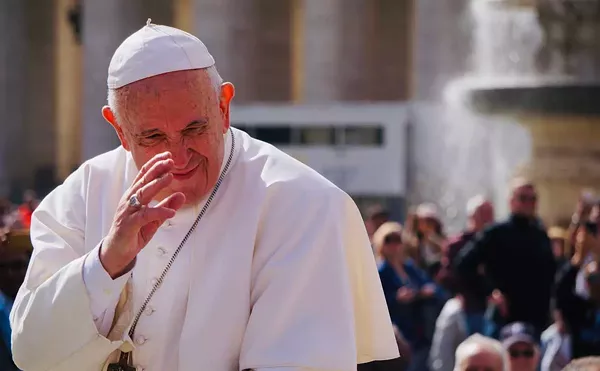
Audio By Carbonatix
[
{
"name": "GPT - Leaderboard - Inline - Content",
"component": "35519556",
"insertPoint": "5th",
"startingPoint": "3",
"requiredCountToDisplay": "3",
"maxInsertions": 100,
"adList": [
{
"adPreset": "LeaderboardInline"
}
]
}
]
Veteran Dutch novelist Cees Nooteboom's work traces the inner spaces of globetrotting protagonists disconnected from their places of origin, so the deceptive synopses of his novels often sound either uneventful or strangely convoluted. Lost Paradise, his latest, belongs to the latter camp, revolving around multiple chance encounters between two very different world travelers — and yet, as often as not, it manages to call into question whether strange and convoluted are such bad traits for a novel after all.
Alma, a young Brazilian hipster of German descent, experiences a sexual trauma in a São Paolo shantytown. This launches a voyage of self-discovery to the land she's mythologized since childhood: Australia. Alma's story makes up Lost Paradise's first act; in the second, we meet world-weary literary critic Erik Zondag, who's built his reputation on catty reviews of new work by aging Dutch masters (including Nooteboom). Zondag travels to a secluded spa where he gets a rubdown from Alma, setting up the meat of the novel: the pair's previous meeting years earlier in Perth.
Erik had traveled to Perth for yet another tedious literary conference but found himself captivated by the city's unusual public art project during his stay: a walking tour of city sights in which people dressed as angels have been nonchalantly integrated into the daily rhythms of city life — one of these "angels," of course, being Alma. Framing all this are notes explaining the project: Nooteboom traveling the world by plane and train, observing two unrelated strangers, and fabricating a story that connects the two.
What may sound conventionally romantic or even pious comes across as neither in Nooteboom's skilled hands — which isn't to say this thin volume is without its flaws. Perhaps not surprisingly, the 73-year-old male author nails the tired bibliophile Erik, but believability sometimes eludes the youthful Alma, as well as both her tragedy in Brazil and the voyage to Australia it inspires. Little details like the music Alma loves — Chico Buarque, Björk — ring true more often than the life decisions she makes.
That said, you can count on Nooteboom to deliver some vividly drawn passages of great beauty, as well as his own very peculiar sensibility. His characters here reference such authors as the late, great Austrian cynic Thomas Bernhard and imaginative Italian luminary Italo Calvino, and it's within that collision between the grim and the playful that Nooteboom's own voice can most often be found. He excels when describing a city's subtle invasion by winged angels via performance art; both Alma, as a participant, and Erik, as an observer first bemused but eventually obsessed, find in the angels not a source of faith or magic, but an intriguing disruption of everyday tedium. In his many little books detailing massive journeys (both literal and figurative), Nooteboom often manages to give readers the same.





